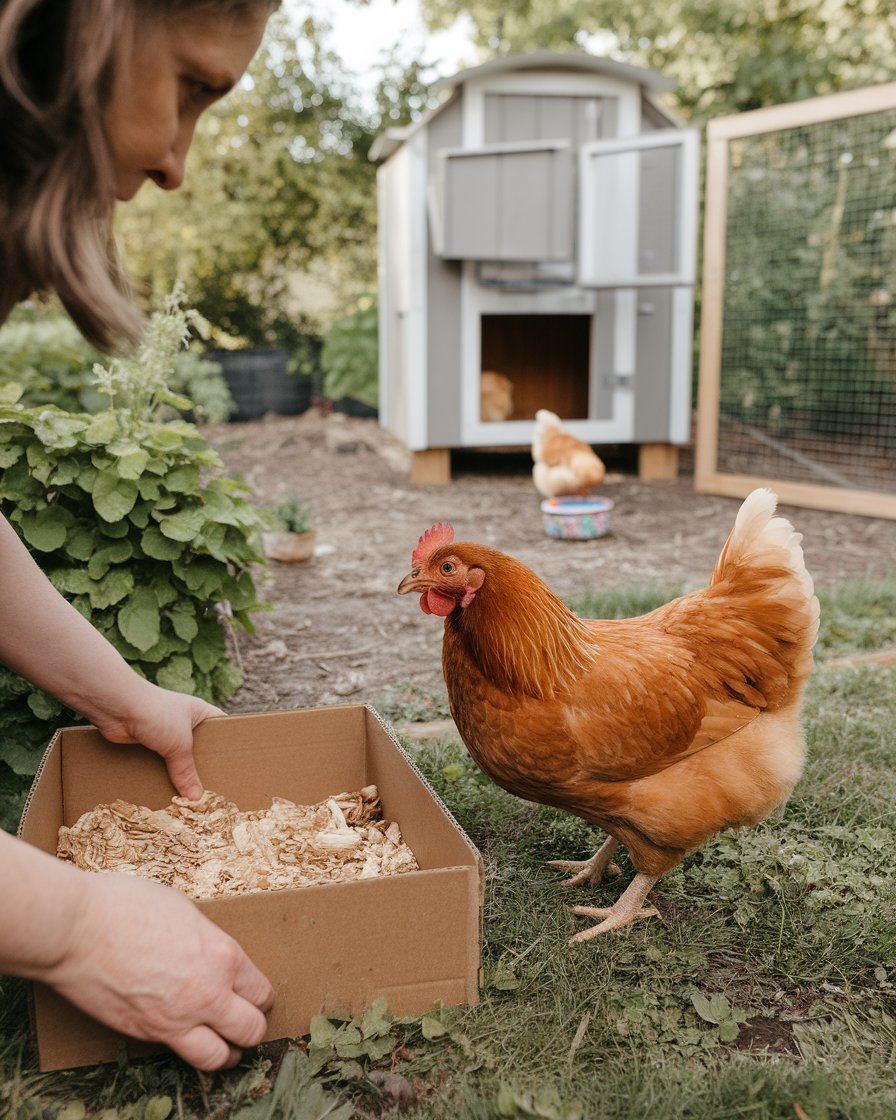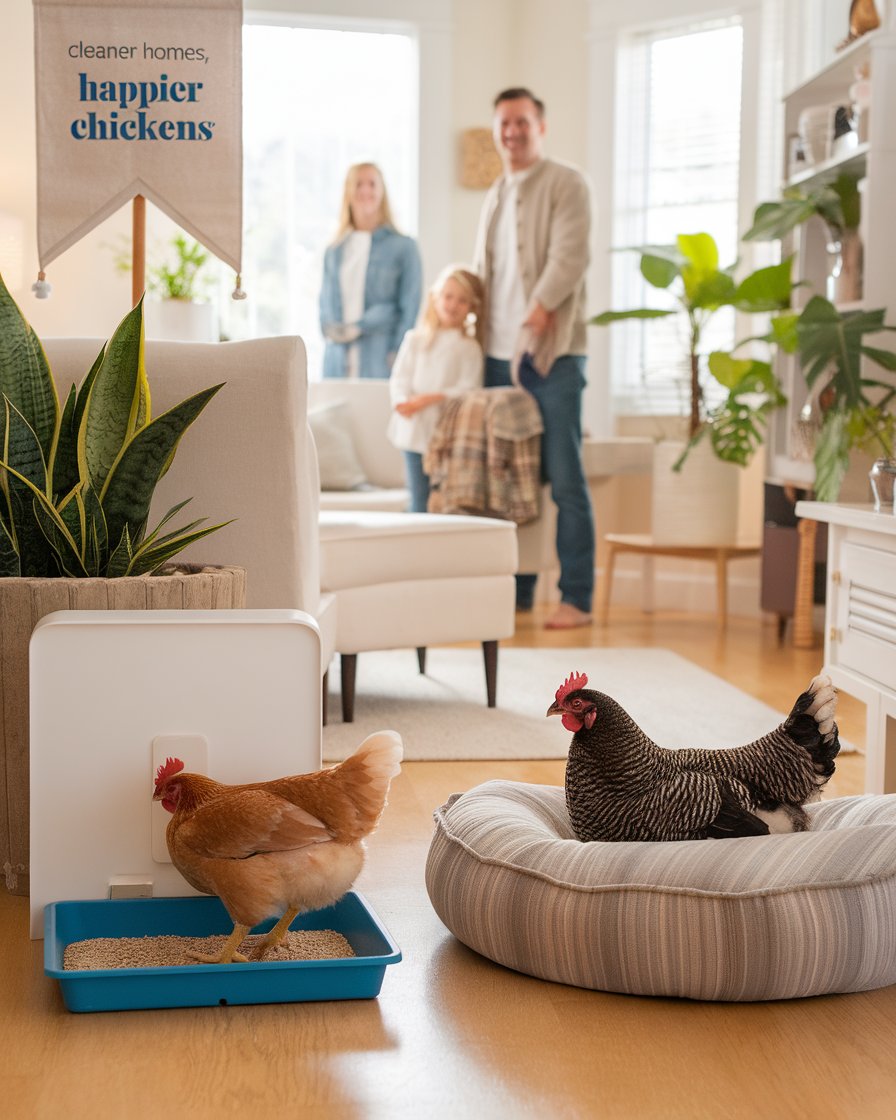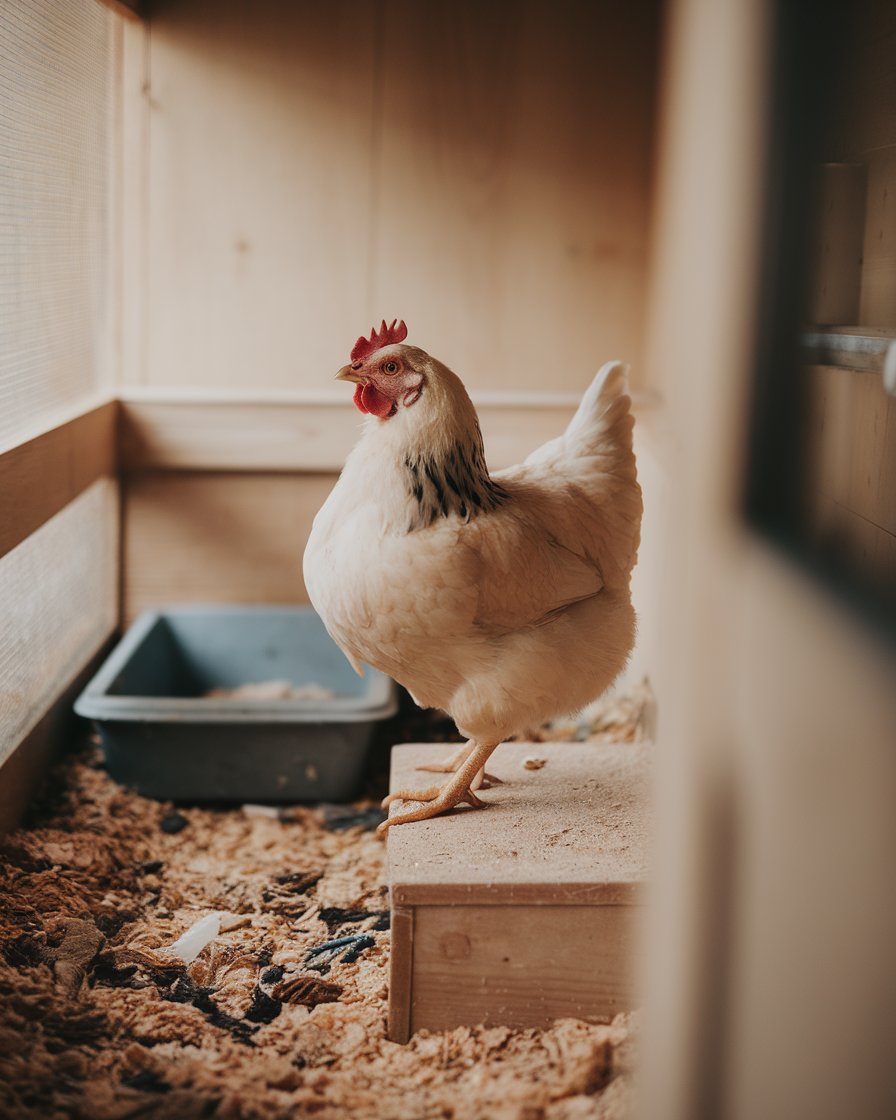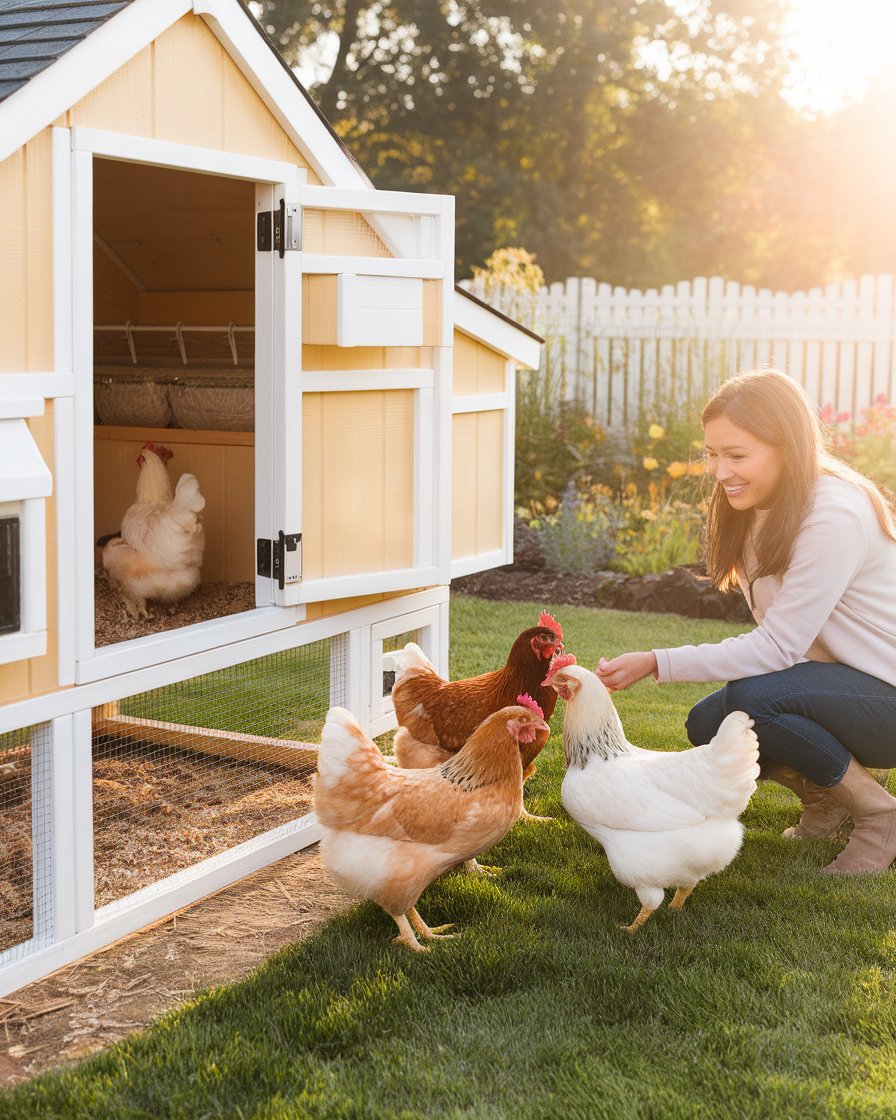Introduction
Potty training a chicken might seem like a daunting task, but with the right approach, it can be an achievable goal. Chickens are intelligent animals, and though they lack full control over their bowel movements, they can be trained to use a designated potty area. Establishing a routine is key to success when it comes to training a chicken. By offering positive reinforcement, such as treats, you can encourage your chicken to poop in the right spot, keeping their space clean. Using verbal commands alongside rewards may help solidify the habit, making it easier for them to follow.
If you really want to potty train your chicken, consistency and patience are crucial. Some owners even use chicken diapers during the training process to manage accidents and give their chicken the freedom to roam indoors. Chickens tend to poop a lot, so whether you’re using a chicken’s litter box or chicken diapers, the goal is to minimize messes. With time, your feathered friend can learn where and when to go.
Key Takeaways
Potty training chickens requires patience and consistency, as they need time to associate a designated potty area with their bathroom routine.
Gathering critical supplies such as a litter box, bedding, and treats is essential for a successful potty training experience.
Positive reinforcement, including food rewards, plays a significant role in motivating chickens to use a specific potty spot.
For indoor chicken owners, chicken diapers can offer a practical solution to prevent frequent messes during the training process.
Managing expectations is crucial, as not all chickens adapt to potty training at the same rate, requiring owners to be patient.
Overcoming training challenges involves using creative approaches, such as clicker training, and understanding each chicken’s individual behavior.
Preparations for Potty Training
Getting ready for potty training your chicken requires time and planning. If you want your chicken to succeed, it’s essential to create a designated potty area. Chickens are surprisingly intelligent animals, capable of learning routines with patience and repetition. Providing a small container for easy cleanup will make the process smoother. Remember, chickens need consistency to make the connection between a specific spot and going to the bathroom. With the right techniques, like using a litter box to eliminate messes and positive reinforcement, chickens can be successfully trained. Offering chicken with a treat after a successful attempt will further encourage the behavior. Over time, even the most reluctant chickens can learn, proving that chickens be trained to use a litter box and behave like any other house pets.
Key Steps for Potty Training a Chicken
1. Understand Chicken Behavior
Potty training a chicken requires an understanding of their natural behaviors. Chickens tend to poop frequently due to their fast metabolism, often up to 12 times a day. They have limited control over their bowel movements, which makes patience essential. However, chickens are intelligent creatures that can be trained to use a designated potty area with the help of positive reinforcement.
2. Create a Designated Potty Area
Establishing a specific area for your chicken to relieve itself is a vital step. This can be done by setting up a litter box in a convenient location, either in the coop or indoors. Ensure the potty area is comfortable, with appropriate bedding material to make it inviting for your chicken. Frequent accidents will occur at the start, but with repetition, your chicken will begin to associate the spot with the task.
3. Gather Essential Supplies
Gathering the necessary supplies for potty training is key to success. You’ll need a litter box, absorbent material such as kitty litter or paper bedding, and a small container for easy cleanup. Using a comfortable and clean environment will encourage your chicken to use the designated area consistently.
4. Positive Reinforcement with Food
Chickens respond well to food rewards, making this an essential part of the potty training process. Every time your chicken successfully uses the litter box, offer a small treat to reinforce the behavior. This positive reinforcement will encourage your chicken to repeat the action. Food-driven chickens quickly learn to associate the potty area with a reward, improving the training process.
5. Consistency is Key
Consistency is the foundation of potty training. Ensure that your chicken has access to the designated potty area regularly, and offer positive reinforcement each time they use it correctly. Training may take several weeks or even months, depending on your chicken’s temperament. Stay patient, as every chicken learns at its own pace.
6. Use Diapers for Indoor Freedom
For those who wish to let their chickens roam freely inside the home, chicken diapers can be a temporary solution. These specially designed diapers prevent messes while giving your chicken the freedom to move around the house. This can be particularly useful during the early stages of potty training when accidents are frequent. However, always aim to wean your chicken off diapers and into using the designated area.
Critical Supplies Needed
Before diving into potty training, gathering the right supplies is crucial. You’ll need a litter box, kitty litter, and a container for cleaning up any chicken poop. Make sure the potty area is comfortable, as bedding material in the potty area can help the chicken feel secure. Having treats on hand is also vital. Training your chicken to use a designated spot will require rewards, so choose their favorite snacks to encourage them to make the association. Many chickens are food-driven, so rewarding them after a successful attempt can accelerate the training process.
Importance of Using Food as Motivation
Food is a powerful motivator when it comes to potty training chickens. Chickens are actually quite intelligent animals that respond well to positive reinforcement. Reward your chicken with treats every time they use the litter box, reinforcing the behavior you want to see. Over time, they will connect the potty spot with a reward. Clicker training, often used for pets, can be paired with treats to help solidify this habit. With enough consistency and positive motivation, it’s easier to train chickens to go to the bathroom in a controlled area, ensuring fewer accidents around the home.
Why Potty Train Chickens?
Potty training chickens might seem unconventional, but it can be highly beneficial, especially for those who consider their chickens part of the household. Chickens are intelligent creatures capable of learning routines with enough consistency. For those wanting to keep chickens indoors, potty training becomes essential to maintain cleanliness and reduce the need for constant cleaning. Providing a designated area where your chicken can relieve itself helps keep their indoor living space more sanitary. Additionally, potty training creates a more enjoyable environment for both chickens and their owners, fostering better interaction between the two. With patience and persistence, chickens can be successfully trained, ensuring a cleaner and more harmonious home life.
Case Study: Successful Potty Training of Indoor Chickens
A family in Portland, Oregon, successfully potty trained their indoor chickens, illustrating the practicality of this unconventional practice. The family kept two chickens, Daisy and Penny, as household pets and wanted to minimize the mess typically associated with chickens indoors. Initially, the family struggled with cleanliness due to the chickens’ frequent pooping, but they implemented a designated potty area within the house. Using a small litter box lined with absorbent material, they trained the chickens to use this space over time.
Positive reinforcement played a significant role in the training process. Every time Daisy and Penny used the litter box, they were rewarded with their favorite treat, creating a clear association between the behavior and reward. Within two months, the chickens had adapted to the routine. This not only reduced the need for constant cleaning but also allowed the family to enjoy more bonding time with their feathered companions.
Indoor Coop Considerations
For those who want to keep chickens inside their home, setting up an indoor coop comes with some unique challenges. One of the primary concerns is maintaining cleanliness since chickens tend to poop frequently—up to 12 times a day. By designating a specific potty area or providing a litter box, you can help control where your chicken relieves itself. Bedding material in the potty area is also a great way to make the space more comfortable for your chicken. Chickens can be trained to use this spot regularly, preventing unwanted messes around the home. With a little time and patience, chickens can learn to adapt to their indoor environments.
Benefits of Potty Training Special Chickens
Potty training is especially beneficial for chickens kept as pets, as it reduces the hassle of constant cleaning and improves the overall experience of having chickens indoors. When chickens are litter trained, the owners can spend less time dealing with accidents and more time bonding with their feathery companions. Special chickens, like those viewed as household pets, can thrive in a cleaner space, making it easier for them to interact with their human family. Training your chicken to use a designated potty spot leads to a healthier, more enjoyable relationship and allows your pet to roam freely inside the home without causing messes.
Potty Training Difficulty
Potty training chickens can be quite challenging due to their unique nature. Unlike traditional pets, chickens don’t have the same level of bladder control, which makes it difficult for them to respond to training. Chickens tend to poop frequently—sometimes up to 12 times a day—due to their fast metabolism, so owners must be prepared for accidents along the way. However, with patience and consistency, it is possible to establish a routine for chickens to use a designated potty spot. It’s important to remember that potty training chickens requires a creative approach, using food rewards and other motivators to reinforce the desired behavior over time.
Overcoming Training Challenges
Training chickens to use a litter box or designated area can be difficult, but there are ways to overcome these challenges. One key is using positive reinforcement, such as treats or clicker training, to encourage your chicken to go to the bathroom in the right spot. However, it’s crucial to remember that chickens don’t have full control over when they poop, which makes accidents inevitable. Diapers can be a great temporary solution during training, as they help keep the house clean while your chicken learns the routine. Consistency, patience, and an understanding of your chicken’s individual behavior will be essential to make progress.
Managing Expectations for Success
When attempting to potty train chickens, managing expectations is essential. While it is possible to train chickens to use a specific area or a litter box, the process takes time and success isn’t guaranteed. Chickens, unlike many pets, don’t easily grasp potty training concepts and may need weeks or even months of effort. Factors like the chicken’s temperament, age, and environment all play a role in how well they adapt to training. Owners should be realistic, understanding that complete success may not always happen. Maintaining a positive attitude, despite setbacks, will make the experience less stressful for both you and your feathered friend.
“Patience and perseverance have a magical effect before which difficulties disappear and obstacles vanish.” – John Quincy Adams
Considerations for Potty Training Success
Successfully potty training chickens requires a combination of patience, consistency, and creativity. Chickens, by nature, have less control over their bodily functions compared to other animals, which can make the training process challenging. However, it is possible to potty train chickens by using methods like positive reinforcement and designated potty areas. Owners need to be prepared for accidents, as chickens tend to poop frequently. Creating a training routine and sticking to it is key, as chickens will eventually associate certain behaviors with rewards. With time and effort, potty training success is achievable, but owners should remain realistic about the challenges involved.
Consistency and Patience
Consistency and patience are the foundation of any successful potty training routine for chickens. It’s important to establish a daily schedule that includes specific times and areas where chickens can relieve themselves. Rewarding the chicken with treats or verbal praise after they use the designated potty spot reinforces good behavior. However, don’t expect quick results—chickens, like all animals, learn at different paces, and setbacks are bound to happen. It’s essential to maintain a calm and positive attitude throughout the process. Remember, training your chicken to go in a specific area will require time, patience, and consistency to be truly effective.
Potential Use of Chicken Diapers
For chicken owners who want to keep their birds indoors, chicken diapers can offer a practical solution. These specially designed diapers allow chickens to roam freely in the house while preventing unwanted messes. Although this might seem unconventional, chicken diapers provide a convenient way to manage the frequent pooping that comes with keeping chickens indoors. They are especially helpful during the potty training process, offering a temporary solution until the chicken learns to use a designated area. While not every owner may prefer this method, it’s a great option for those looking to form a closer bond with their feathery companions without the constant cleanup.
Conclusion
In conclusion, while potty training chickens may seem unconventional, it is indeed possible with the right approach. Chickens can be potty trained using consistent routines, positive reinforcement, and a designated potty area, which helps reduce the mess typically associated with keeping chickens indoors. By understanding that chickens have little control over their bowel movements, owners can manage expectations and provide tools like litter boxes or chicken diapers to maintain a clean environment around the chicken.
For those who really want to potty train their chickens, patience and persistence are key. Whether you’re using chicken coops or allowing them to roam freely indoors, providing rewards like treats can encourage your chicken to use the potty effectively. Each individual chicken may respond differently, so be prepared to adjust based on their behavior. With time, even young chickens can learn to adapt, making it a great way to keep a clean and happy home for both you and your feathery pet.











